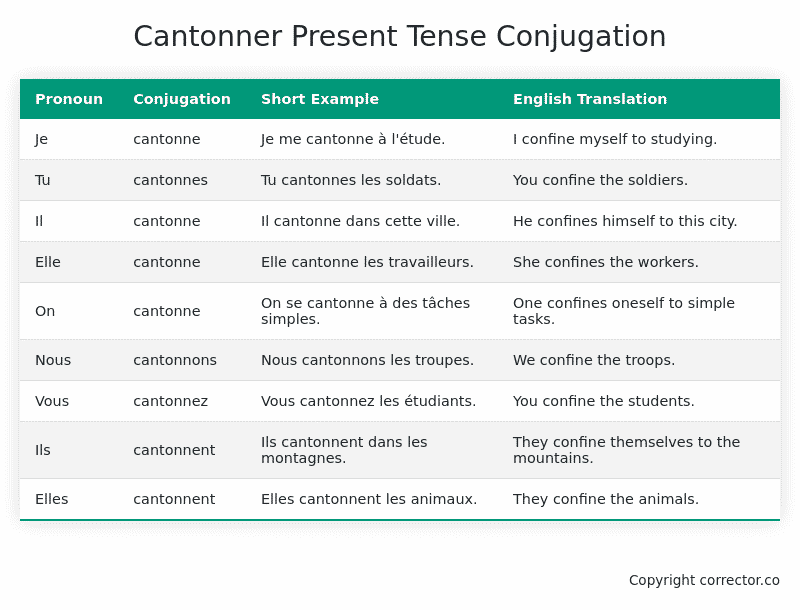Le Present (Present Tense) Conjugation of the French Verb cantonner
Introduction to the verb cantonner
The English translation of the French verb “cantonner” is “to quarter” or “to confine”. The infinitive form “cantonner” is pronounced as “kahn-ton-ay”.
The word “cantonner” originates from the French noun “canton” which refers to a district or division of a country. In everyday French, “cantonner” is most often used to describe the action of assigning or limiting someone or something to a specific area or task.
Examples:
- Les soldats ont été cantonnés dans un petit village. (The soldiers were quartered in a small village.)
- Elle a été cantonnée aux tâches administratives. (She was confined to administrative tasks.)
- Les jouets étaient cantonnés dans une boîte en bois. (The toys were confined to a wooden box.)
Note: The English translations provided are approximate and may vary based on the context.
Cantonner – About the French Present Tense
To take a deep dive into all the French tenses then see our article on Mastering French Tense Conjugation.
Common Everyday Usage Patterns For Le Present
Interactions with Other Tenses
Table of the Present Tense Conjugation of cantonner
| Pronoun | Conjugation | Short Example | English Translation |
|---|---|---|---|
| Je | cantonne | Je me cantonne à l’étude. | I confine myself to studying. |
| Tu | cantonnes | Tu cantonnes les soldats. | You confine the soldiers. |
| Il | cantonne | Il cantonne dans cette ville. | He confines himself to this city. |
| Elle | cantonne | Elle cantonne les travailleurs. | She confines the workers. |
| On | cantonne | On se cantonne à des tâches simples. | One confines oneself to simple tasks. |
| Nous | cantonnons | Nous cantonnons les troupes. | We confine the troops. |
| Vous | cantonnez | Vous cantonnez les étudiants. | You confine the students. |
| Ils | cantonnent | Ils cantonnent dans les montagnes. | They confine themselves to the mountains. |
| Elles | cantonnent | Elles cantonnent les animaux. | They confine the animals. |
Other Conjugations for Cantonner.
Le Present (Present Tense) Conjugation of the French Verb cantonner (You’re reading it right now!)
Imparfait (Imperfect) Tense Conjugation of the French Verb cantonner
Passé Simple (Simple Past) Tense Conjugation of the French Verb cantonner
Passé Composé (Present Perfect) Tense Conjugation of the French Verb cantonner
Futur Simple (Simple Future) Tense Conjugation of the French Verb cantonner
Futur Proche (Near Future) Tense Conjugation of the French Verb cantonner
Plus-que-parfait (Pluperfect) Tense Conjugation of the French Verb cantonner
Passé Antérieur (Past Anterior) Tense Conjugation of the French Verb cantonner
Futur Antérieur (Future Anterior) Tense Conjugation of the French Verb cantonner
Subjonctif Présent (Subjunctive Present) Tense Conjugation of the French Verb cantonner
Subjonctif Passé (Subjunctive Past) Tense Conjugation of the French Verb cantonner
Subjonctif Imparfait (Subjunctive Imperfect) Tense Conjugation of the French Verb cantonner
Subjonctif Plus-que-parfait (Subjunctive Pluperfect) Tense Conjugation of the French Verb cantonner
Conditionnel Présent (Conditional Present) Tense Conjugation of the French Verb cantonner
Conditionnel Passé (Conditional Past) Tense Conjugation of the French Verb cantonner
Conditionnel Passé II (Conditional Past II) Tense Conjugation of the French Verb cantonner
L’impératif Présent (Imperative Present) Tense Conjugation of the French Verb cantonner
L’impératif Passé (Imperative Past) Tense Conjugation of the French Verb cantonner
L’infinitif Présent (Infinitive Present) Tense Conjugation of the French Verb cantonner
L’infinitif Passé (Infinitive Past) Tense Conjugation of the French Verb cantonner
Le Participe Présent (Present Participle) Tense Conjugation of the French Verb cantonner
Le Participe Passé (Past Participle) Tense Conjugation of the French Verb cantonner
Struggling with French verbs or the language in general? Why not use our free French Grammar Checker – no registration required!
Get a FREE Download Study Sheet of this Conjugation 🔥
Simply right click the image below, click “save image” and get your free reference for the cantonner present tense conjugation!

I hope you enjoyed this article on the verb cantonner. Still in a learning mood? Check out another TOTALLY random French verb present conjugation!


